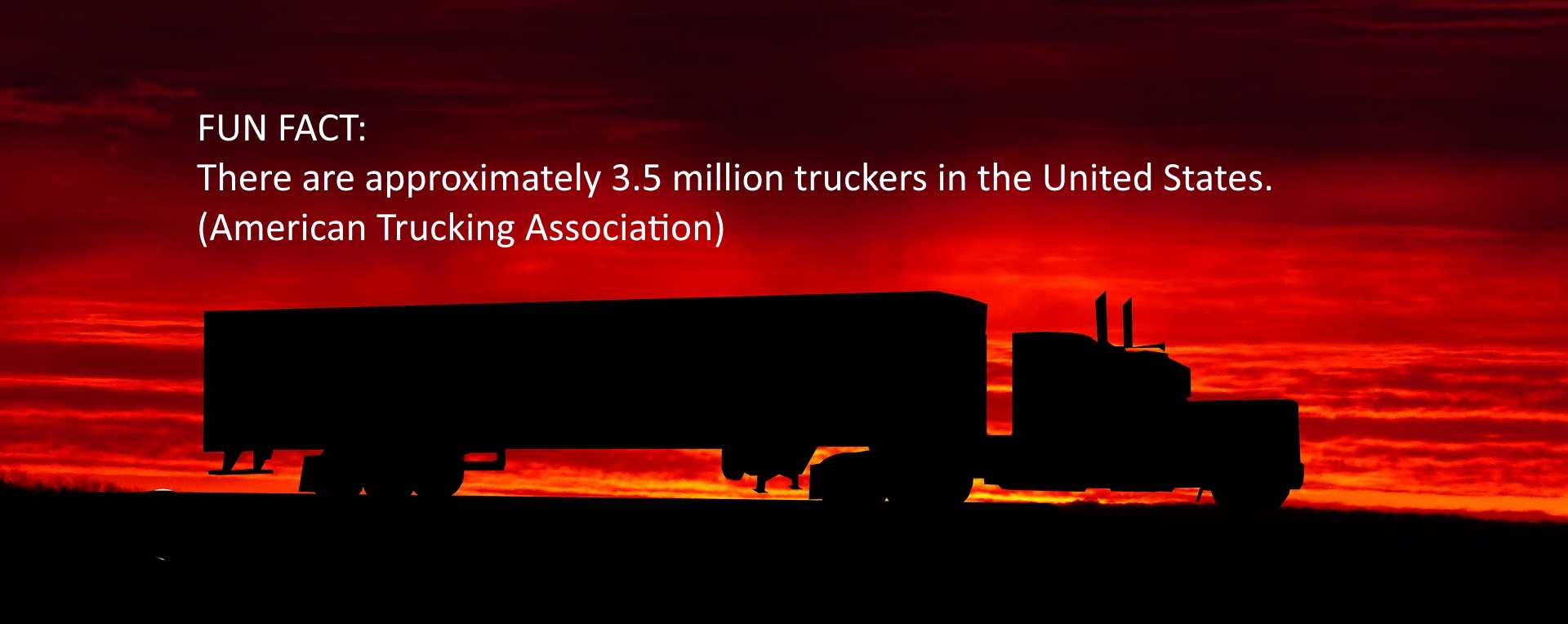When I was a child, I would peer into the cabs of trucks during road trips and wonder about the many lives whipping by. Truck drivers have been a longstanding, almost mythologized part of American culture. Their jobs are also speculated to be one of the first to go as we move towards self-driving vehicles. Over the past two years, I’ve become fascinated and terrified by the possibilities of artificial intelligence and what the social impact will be of a society powered by the next level of automation.
This drove me to apply to the Civilians’ R&D group to write a project titled “Drive.” In “Drive,” a community of truckers in a small town in Iowa are forced to shift gears when they lose their jobs to self-driving trucks. Set in a future not far down the road, “Drive” explores our collective fears surrounding the next stage of automation and what happens when individuals in a country where we’re so defined by our work are forced to reevaluate what drives them.
My research started in Mustang Ridge, TX, on a warm September afternoon at a Pilot Travel Center – the busiest one I could find within 40 miles from my folks’ home in south Austin. The type where trucks pull in and out, park in the back, and drivers rent showers. I had an idea, a general sense of the play’s structure (still malleable) and had come up with characters who theoretically populated the play’s world. But in my experience, you don’t know a play until truths about the characters’ world hits you like a truck. Usually at that point, the play writes itself.
I needed a deeper sense of their realities, perspectives, and a fuller investigation into the issues at the heart of my play. So, I talked to truckers. A lot of them.
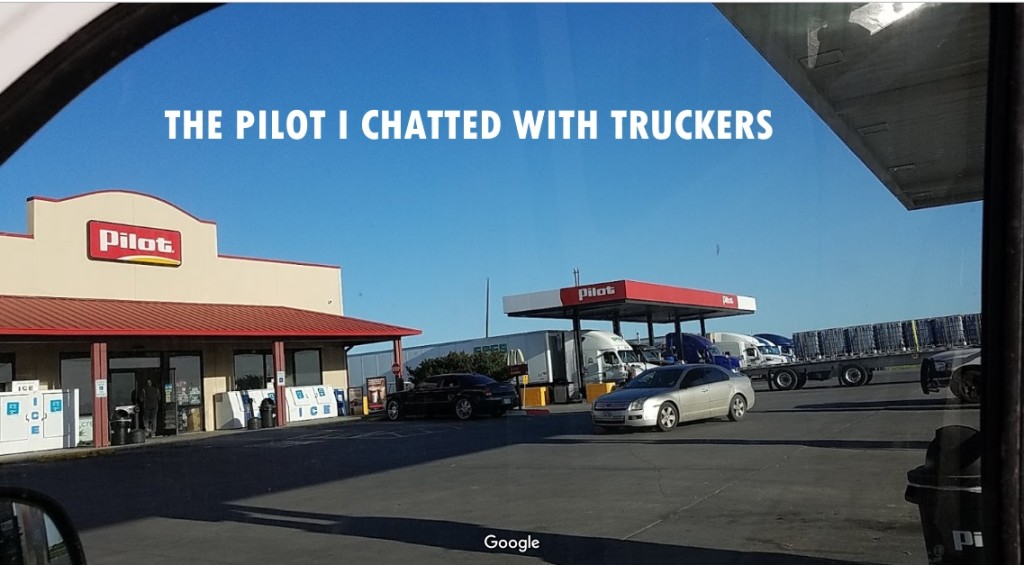
I’d called an attendant at the Pilot in advance to make sure they would be cool with me hanging out all day. They not only were open to me being there, they gave me safety recommendations and promised to keep an eye out for me. They also throughout the day directed me to truckers that were regulars they thought would have interesting things to say.
I explained to truckers entering the Pilot that I was working on a fictional play about truck drivers and asked if they had time to chat about the truths of their day-to-day realities. Responses varied from, “No. I don’t. That’s the truth of being a trucker,” to some graciously talking to me for over twenty minutes. One guy admitted over McDonald’s, “It’s lonely out on the road as a solo driver. Conversation is nice.”
I asked them not to censor themselves for me. My goal was to get answers but also to pick up on their voices, colorful expressions, and gritty details.
My conversations at the Pilot led to a key resource a trucker recommended: Facebook groups— hundreds of them. All about the lives of truckers, some with a dark humor that trickled into my characters’ worldviews. Like Twisted Truckers (which has over one million followers), where truckers post things like pictures of accidents they encounter often with humorous quips.
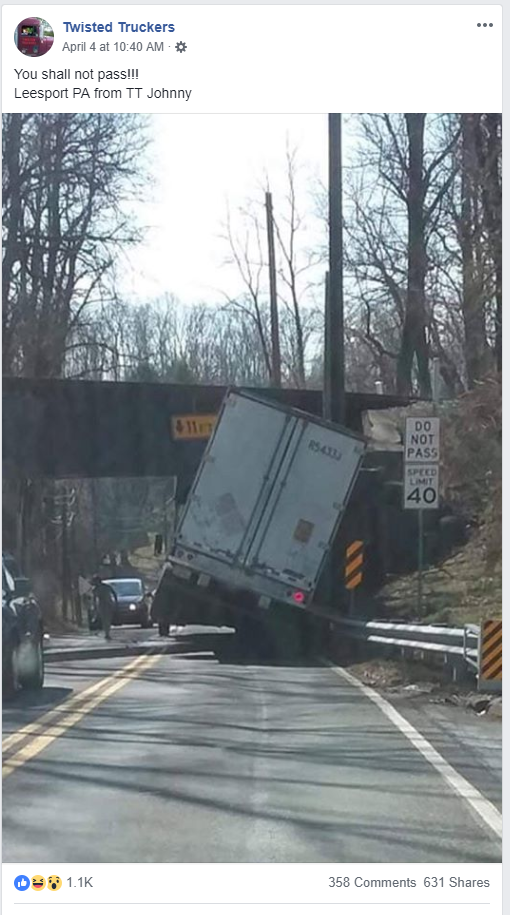
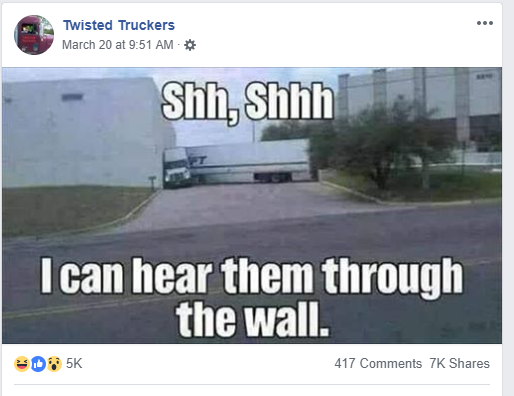
Witnessed accidents came up a lot during my conversations with truckers. Almost every driver I talked to (whether in person at the Pilot, or truckers I’d connected with through a Facebook trucker group), when I asked about a memorable experience on the road, had a harrowing tale.
We mostly chatted about their day-to-day lives, what they do on the road (listening to music and comedy were popular answers). I also probed to get a sense of what led them to trucking.
Then I asked a tricky question that tied to the core of my play: What are their thoughts on the future of self-driving trucks and how do they think it may impact truckers’ lives? I saved this for the end because it’s a potential conversation stopper. It lives somewhere between what some might see as a stupid, annoying question; and one that requires deep thought and reflection.
But for those who continued the conversation, I got answers. My takeaways from my super non-scientific survey and limited sample size:
Most truckers I talked to couldn’t conceive of a reality where a human won’t be involved. “Stopping for fuel. Changing a tire. Putting on chains cannot be done by a driverless truck.”
When asked, many speculated on what life would be like if truckers were suddenly, en masse, out of work:
“It’s going to be one hell of an uprising.”
“If that happened tomorrow? There’d be a lot of pissed off, depressed people.”
“Yea, some guys would be lost.”
“I’d go back to the penitentiary,” one guy admitted.
Those in their 50s and 60s, told me they’d just retire.
Trucking’s not just a job; for many, it’s a lifestyle.
From what I understand though, the reality of autonomous trucks is currently this:
It’s debatable when or how soon, but autonomous trucks are not impossibly far down the road. And eventually, we’ll hit a phase where humans won’t be needed.
From my research, this is my understanding: At first, drivers will likely pilot autonomous trucks. Perhaps there will be one driver at the helm and several autonomous trucks convoying behind. And then in time, the humans will no longer be needed (not in droves at least).
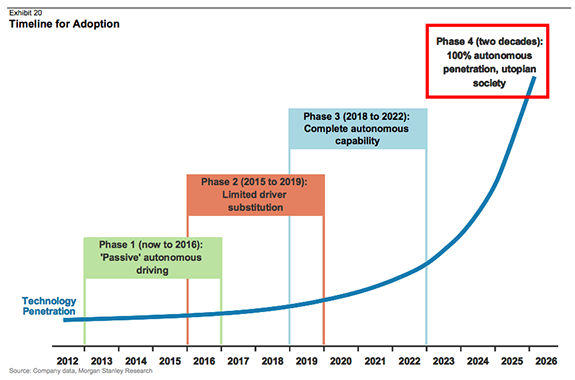
Self-driving trucks replacing drivers is on the horizon. It’s only being held up by current technical limitations and laws. And should the technology be perfected, in time, accidents would likely become rarities. Most are caused by human error. Companies would save money. Lives would be saved. And a major problem would be solved: as people increasingly order products online, more and more trucks are needed. Presently there’s a huge shortage of drivers.
But this presents another problem, eventually many truck drivers will be out of work. This is startling, considering currently trucking is the number one job in 29 states:
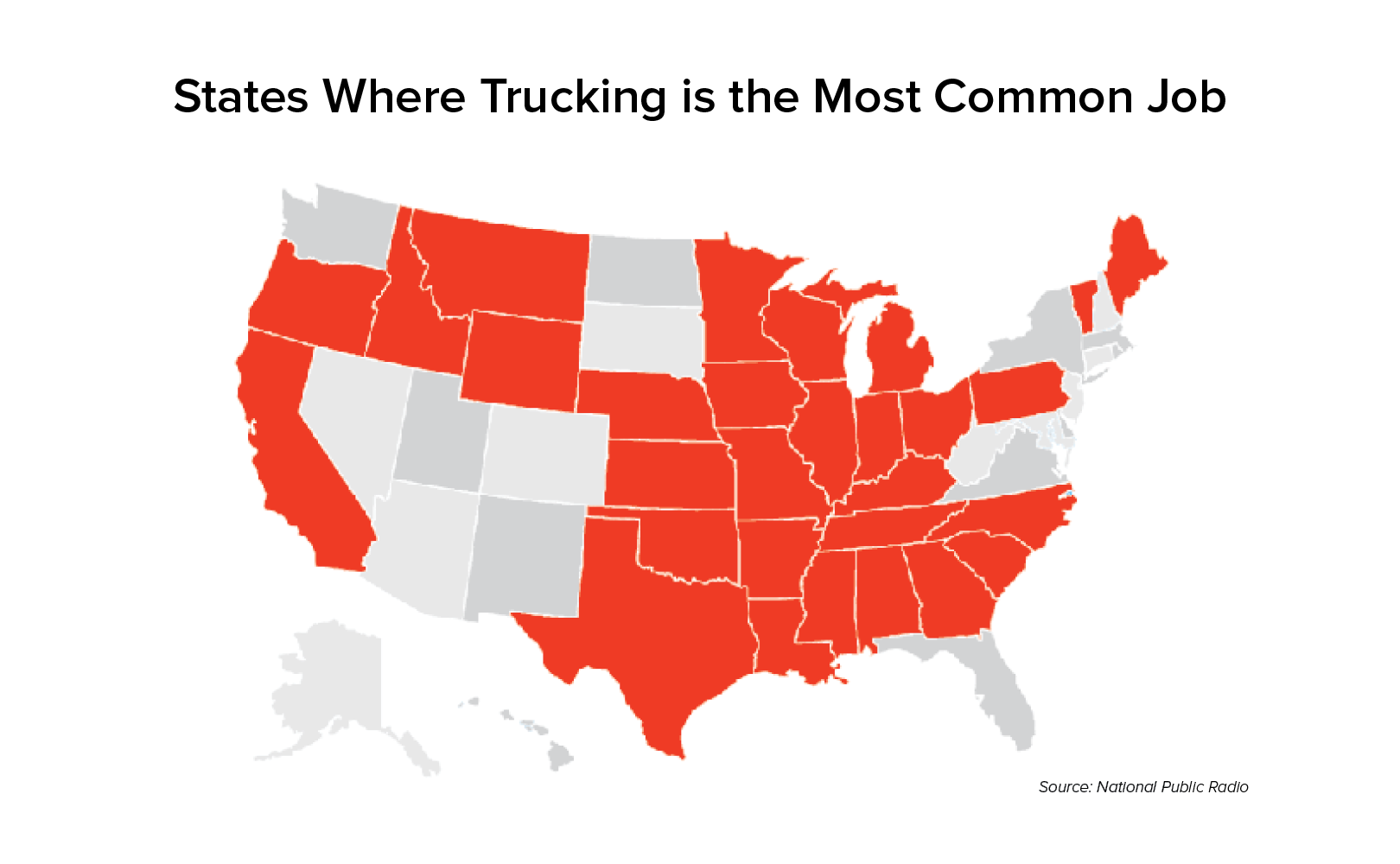
The thing that struck me most from my chats with truck drivers was how inconceivable a world without truckers seemed to most of the folks who talked to me.
“Drive” will be read on May 22, 2019 at 7pm, at The Lark (311 West 43rd St. 5th floor) through the Civilians’ FINDINGS Series. The FINDINGS Series is free to the public, but reservations are required as space is limited. Reserve your seats by emailing civiliansrsvp@gmail.com. Please indicate number of tickets and show title.

Deborah Yarchun is an NYC-based playwright and a member of the 2018-2019 Civilians’ R&D Group. Her plays have been developed at Ensemble Studio Theatre, The New Harmony Project, Jewish Plays Project’s OPEN Festival, The Great Plains Theater Conference, Jewish Ensemble Theater, The Playwrights’ Center, Rattlestick, TheatreSquared, the William Inge Center for the Arts, WordBRIDGE, and Williams Street Rep, and produced at places including Fusion Theatre, the Minnesota Fringe, the Philadelphia Fringe, Playwrights Horizons’ Peter Jay Sharp Theater by Young Playwrights Inc., and Williams Street Rep. Deborah’s honors include two Jerome Fellowships at The Playwrights’ Center, a 2017-2018 Dramatists Guild Foundation Fellowship, an EST/Sloan Commission, The Kennedy Center’s Jean Kennedy Smith Playwriting Award, the Kernodle New Play Award, the Richard Maibaum Playwriting Award, and the Women in the Arts and Media’s 2019 Collaboration Award. Deborah earned her M.F.A. from the University of Iowa where she was an Iowa Arts Fellow. You can read more about her work at DeborahYarchun.com.
Author
-

The Civilians is a company that creates new theater from creative investigations into the most vital questions of the present. Through a number of artistic programs, the Civilians advances theater as an engine of artistic innovation and strengthens the connections between theater and society. An artist-led company, the Civilians creates and produces new theater and pursues its artistic mission through programs serving artists and the public. The company’s work is grounded in investigative theater, an artistic practice rooted in the process of creative inquiry that brings artists into dynamic engagement with the subject of their work. Artists look outward in pursuit of a question, often engaging with individuals and communities in order to listen, make discoveries, and challenge habitual ways of knowing. The ethos of investigative theater extends into production, inviting audiences to be active participants in the inquiry before, during, and after the performance. Since its founding in 2001, the Obie Award-winning company has supported the creation of 14 original shows, and its work has been produced at many theaters in New York, nationally, and internationally. Last season saw two highly successful shows: "Mr. Burns: a Post-Electric Play" at Playwrights Horizons, which was included in eight Top 10 of 2013 Lists, and "The Great Immensity" at The Public Theater. The Civilians’ work has been published by Dramatists Play Service, Oberon Books, Ghostlight Records and Playscripts, Inc.
View all posts


